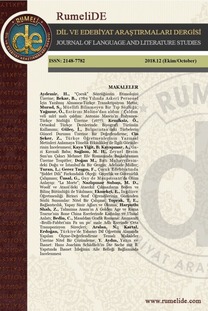MEHMET AKİF ERSOY'UN ŞİİRLERİNDE İLAHİ ADALET VE KÖTÜLÜK MESELESİ
İlahi adalet ve kötülük problemi, felsefenin önemli tartışma konularından biridir. Mesele Tanrı-âlem ilişkisi, insanın sorumluluğu, ahlak ve siyaset ile yakından ilgilidir. Bir düşünürün bu konuda getirdiği yorum, doğal olarak onun diğer düşünceleriyle de irtibatlıdır. İslamcılık akımının önemli isimlerinden olan Mehmet Akif'in şiirlerinde konuya dair küllî plandan bakılınca şathiye türündeki şiirleri anımsatan ifadelerle meselenin anlaşılmasının zorluğuna işaret edilmiştir. Cüz'i planda ise bu dünyadaki düzenin ve adaletin tesisinde insanın sorumlu bir varlık olduğuna vurgu yapılmıştır. Anlaşılması ve çözüme kavuşturulması oldukça zor olan bu meseleye, son dönemin önemli düşünürlerinden olan Mehmet Akif'in getirdiği açıklama onun, varlık düzeni, inanç ilkeleri, siyaset ve ahlak gibi konulara dair düşüncesini anlamamıza katkı sağlaması itibarıyla incelemeye değerdir.
DIVINE JUSTICE AND THE PROBLEM OF EVIL IN MEHMET AKİF ERSOY'S POEMS
One of the controversial issues of philosophy is the problem of evil and divine justice. The problem is very concerned with the relation of God and universe, responsibility of man, ethics and politics. Remarks of a thinker is naturally related to other thoughts of him as well. In Mehmet Akif's, who is one of the important figures of the movement of Islamism, poems when it is considered from the holistic plan, with the statements reminiscent of şathiye genre of poems, understanding the problem is very difficult. In the particular plan, man as a responsible being in the establishment of justice and order in the world is emphasized. One of the significant thinkers of the last period Mehmet Akif's explanation, on this complicated and inexplicable question, deserves enquiry in order to understand his thoughts on the order of being, belief principles, politics and ethics.
___
wikipedia.org: https://tr.wikipedia.org/wiki/K%C3%B6t%C3%BCl%C3%BCk_problemi (2017, 02 12).Durusoy, A. (1993). İbn Sînâ Felsefesinde İnsan ve Âlemdeki Yeri, İstanbul: İFAV. Ersoy, M. A. (1991). Safahat. (M. E. Düzdağ, Haz.) İstanbul: İz.
Ziya Paşa (1327). Tercî-i Bend ve Terkîb-i Bend. Dersaadet: Dersaadet.
Peterson, M.; Hasker, W.; Reichenbach, B. & Basinger, D. (2009). Akıl ve İnanç (2 b.). (Rahim Acar,
Nebi Mehdiyev, Hümeyra Özturan & Osman Baş, Çev.) İstanbul: Küre .
İbn Sînâ (2005). Kitâbu'ş-Şifa (Metafizik-II). (Ömer Türker & Ekrem Demirli, Çev.) İstanbul: Litera.
- ISSN: 2148-7782
- Yayın Aralığı: Yılda 6 Sayı
- Başlangıç: 2014
- Yayıncı: Yakup YILMAZ
Sayıdaki Diğer Makaleler
BİR TIP KİTABI: HAZĀ KİTĀBU İLMİ HİKMET ¤ANİ’Ş-ŞİFĀ
BİR DÜŞÜNCE VE EYLEM İNSANI OLARAK MEHMET BEHÇET PERİM (1896-1965)
ÖLÜM YOLUNDA İKİ ŞÂİR, BİR ÂŞIK
Yong-Sŏng Lİ: C. Brockelmann’ın “Doğu Türkçesi Grameri” Dizini
MEHMET AKİF ERSOY'UN ŞİİRLERİNDE İLAHİ ADALET VE KÖTÜLÜK MESELESİ
BİR AYDIN PARODİSİ: TUTUNAMAYANLAR
SATIR ARALARINI GÜN YÜZÜNE ÇIKARMAK: BİR YAZINSAL YAPITTA TARİHTEN
TANITMA: Gönül Alpay Tekin, Hayat Ağacı, Yeditepe Yayınevi, İstanbul 2017, 671 s.
ALMANYA'DA KONUŞULAN TÜRKÇEYE YÖNELİK ALMANYA'NIN DİL PLANLAMA ÇALIŞMALARI VE SONUÇLARI
